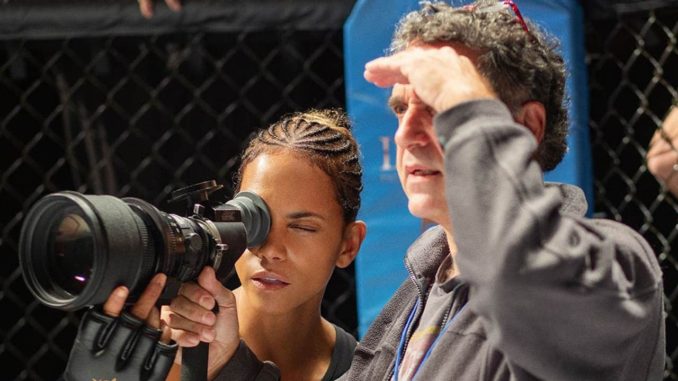
The reviews and ratings are coming in for Halle Berry’s directorial debut Bruised, a redemption story about a disgraced MMA fighter who gets a second chance at life. After watching it on Netflix over the Thanksgiving break, it was clear to see that Berry has successfully reinvented herself on the other side of the camera.
The storyline, acting performances, all the way down to the female empowering score, were all intricate details that made Bruised a worthy two-hour watch. But, leave it to certain Hollywood detractors who have taken to review websites and industry plant platforms to denigrate Berry’s work, one would think it’s the worst film ever made.
Skimming the headlines, some critics complain that the pic sways too far from the genres that Berry is known for. Others can’t seem to stomach the intense focus on the theme “I am woman, hear me roar.” Most of the reviews exemplify an air of condescension and misogyny. There’s reason for the grumbling, but it’s not a legitimate reason.
Similar to films such as Good Will Hunting and Rocky, all films that show protagonists with extraordinary potential muddled by a misaligning of purpose and faith in oneself, from the jump, Jackie Justice (Berry) is presented as a diamond in the rough…perhaps, too rough for some. She has an aggressive mouth on her that’s maybe too uncouth for the patriarchy, and she even has the gall to verbally and physically challenge her live-in boyfriend, Desi (Adan Canto).
To top that, she carries on with her mother, Angel, and even some Goliaths in the ring. But, as the film rounds out, it soon becomes apparent that the biggest fight is within herself. It’s mind over matter, it’s triumph over adversity. A perfect holiday pic about redemption and working through your weaknesses.
Yet, the riveting story that includes themes of domestic violence, poverty, single motherhood, and sexual curiosity is to some another reason to complain. Just around the river-bend, a skip and hop to the ratings for the latest Ghostbusters film, and somehow the fictional, make-believe Jason Reitman pic is the recipient of rave reviews. How ridiculous is the contradictory bias in all this? Well, Ghostbusters is another two-hour film that has entered the theaters around the holiday season, and nearly no one seems to complain about the time. However, check the reviews for Bruised on websites such as Rotten Tomatoes and you’ll see people criticize the length of the film.
Financial Times Danny Leigh gives a backhanded compliment as he writes, “Against quite some odds, the film feels real. Next time, just make it half the length.”
A general consensus for others was that the film was not surprising enough. New York Post’s Johnny Oleksinski calls the main character a “hot mess” that could be put to “better use in a movie with some originality.” Really? So, assuming these critics didn’t analyze the “mess” out of the trailer trying to figure out the film before it released, the surprising element of Jackie having a horribly toxic mother suddenly drop off a son that Jackie has no motherly connection to or Jackie’s sudden love affair with Zen chanting trainer Buddhakan wasn’t enough?
What more do these attention-deficit, coffee (and everything else) addicted critics need. Maybe something similar to a Lovecraft Country where all of a sudden a Civil Rights era period piece is infiltrated by demonic shape shifting persons and sci-fi creatures as the main characters are transported to other worlds. Even that unique universe was not enough to not get panned.
Somehow, critics are now expecting sports dramas to not have cliches, but there’s a formula and a science that all athletes know. It requires mental and physical training. It requires overcoming adverse situations at home that threaten to interfere with the subject’s goal of ultimate achievement. The formula was acceptable for Rocky, Remember The Titans, Creed, Moneyball, The Big Lebowski, and Karate Kid, just to name a few. And no one complained that the sports cliches were done before. What do these films all have in common? Number one, the sports drama formula of underdog to people’s champ. Two, they’re all male-led stories.
Another thing about originality, critics complain that there’s not enough, yet moviegoers have been forced to buy tickets to remakes, reimaginings, sequels, television-to-film adaptations, and vice versa. Clearly, there’s plenty of content saturating the market that deserves the criticism of not being original. With that said, the top criticism for Bruised should not be its originality.
The fact that Halle Berry is synonymous to beauty, is a person of color, and a woman, seems to get under people’s skin. Bruised is an unparalleled story that taps into a genre of sports (MMA) that is rarely served in Hollywood and has a Black woman lead. There’s nothing “unoriginal” about that. Besides Love & Basketball and King Richard, the latest tennis biopic on Serena and Venus Williams, Hollywood hasn’t exactly been dropping back-to-back films on Black female leads in sports films.
There’s a few legitimate questionable moments that the film could be judged for, instead of focusing on time and originality. Judge the aggressive and sudden build up that becomes an awkward conversation between Jackie and her mother about sexual abuse. Judge the overdoing of Puerto Rican pride that saw Desi with a huge “Boriqua” tattoo lining his neck, a flying Puerto Rican flag in his house, and Puerto Rican boxing gloves on his rearview mirror. At your own risk, even judge the LGBTQA+ inclusion that came subliminally at first when Jackie’s mother places a wig on Jackie’s son without permission, or directly, when Jackie sleeps with her female trainer although she is only curious and not an actual lesbian.
The picnicking subpar reviews that say Bruised falls short because of genre conventions are doing a disservice to the overall packaging of the film. Let’s keep it real. In the real world, women sports are not supported like male sports. Could it be possible that the same mentality is being translated over into films that depict that world? The movie may not be a 10 out of 10, but it certainly deserves a passing grade. It’s a watch that you’ll enjoy — that is, unless you’re misogynistic, sexist, and racist.
Bruised is available to watch on Netflix and in select theaters.
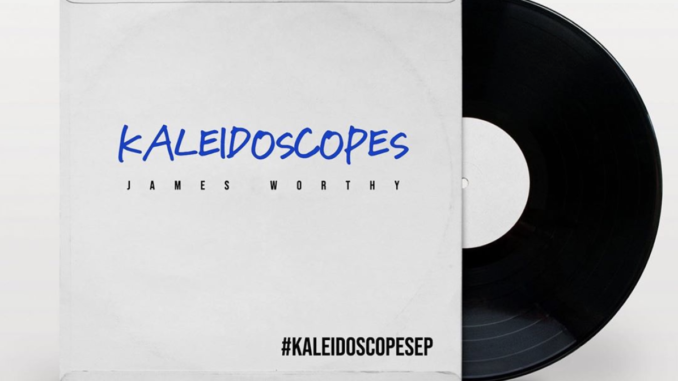
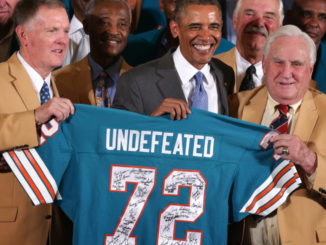
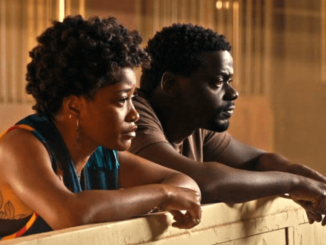
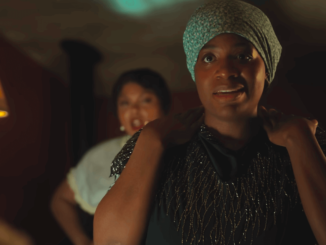
1 Trackback / Pingback
Comments are closed.